#nakatagai
Text
Miss Kyouko's Cipher Table (1/5)
1
Marui to shikakui ga nakatagai
Gyakusankakukeidewa nare nareshii
Chokusennaraba natsukkoi
The round and square are at odds
Inverted triangles are overly familiar
While straight lines are attached
2
The criterion of right and wrong is no different from a code—this is often what Yuinouzaka Nakoudo pondered, how earnestly he wished that someone would sort out the ‘good’ and the ‘bad’ in a neat little list.
If he went around bragging about such things, he might well get told off with "Can't you even tell good from bad on your own?!" And even if told off for that, it would only be after he had been shouted at that he would realize, "Oh, so that's something I shouldn't say." Objectively, just because you had been scolded, it does not necessarily follow that the scolder was right. They may be loud-mouthed and more precisely defined in where they want to stand, nothing more—everybody knows that what is right is not determined by how loud you are, nor is goodness determined by how strongly it is championed. This is anything but a criterion.
So what is the criterion?
Much as Yuinouzaka craves for one, there still is no such decoder ring in this world capable of translating ‘right’ and ‘wrong’ into common sense and nonsense—The accusation of "common sense should be enough to judge these things" is essentially based on certain empirical rules, and he is not yet stubborn enough to deny it out of hand. But when you think about it further, the line between common sense and nonsense is pretty arbitrary.
It is not uncommon for what is a friendly greeting in one culture to represent provocation in another; in cases like that, even devoid of malice, the action will be judhed ‘wrong’. Bypassing for the moment the debate whether the fault lies in the improper conduct or in ignorance—he just couldn't suppress his yearning to to take inventory of the judgement itself.
True, if it were a matter of greeting ettiquete, body language, or word choice, then we can chalk it up to cultural, geographical, or customary differences. But if everything could be so easily explained, then it would all be trivial knowledge of life or jests that could be laughed off.
But there are cases where a joke just won't do.
Still unwritten cultural rules may allow wriggle room for ambiguous smiles in Japan and shrugged shoulders in the West, but what if it were codified in law?
The statute books.
In a sense, it may be a catalogue of good and evil, a sort of Rosetta stone for deciphering right and wrong, just what Yunouzaka had sought—but in fact, if you actually read the whole of the Six Codes of Law, you find that interpretation of the law is infinite.
Law itself is, for the most part, highly encrypted text—entirely different, diametrically opposed meanings can be derived from the same article, with experts in courtrooms then debating 'which is correct.'
It is certain that if we leave no room for interpretation, we run the risk of making our rules rigid and dead, but on the other hand, the very diversity of interpretation means that if we insist on a strict interpretation of the law, there will be a contradiction in saying that not a single person is not a criminal― there is no one alive who has not committed a crime—perhaps this should already be common sense.
It is said that you should read the intention of the law, when it was enacted, rather than the words of the law itself, but the so-called "intention" still seemed to him to be of obscure and elusive countenance. To pinpoint the crux concretely, it would be easier to understand through an analogy. In football, for example, people often say that the reason offsides is a foul is because it is "despicable, unsportsmanlike". But if offside is unsportsmanlike, then an offside trap is even more so.
There is deliberate misuse of the law—more extremely, abuse—here and there. Beyond the illogical, some articles are downright absurd, and, if only looking at the intention, appear to be either mistakes or private whims of past regimes masquerading as ‘moral standards’.
Then legislation is far removed from justice and equity.
That is to say, it is a statute, in other words, a code, and not necessarily a moral or ethical code, as the case may be—but it is also true that when you try to do good, rules and customs get in the way.
That being the case, statute books would be more akin to poetry than narrative—let interpretation fall to the reader. Still, if all the statute books were collected into one codex, there should not be an infinite number of meaning and contradictions—in reality, however, a statute book is not one volume.
Multiple texts cover the same ground. Even domestically, this happens, and venturing overseas reveals a vast number of alien cultures.
In Japan, for instance, it is illegal to sell rulers in inches, an imperial unit. The urge arises to ask—what could possibly be wrong with that? Yet through reading of the law as it stands, by not conforming to the metric standard, inch-unit rulers violate the principles underlying the law and are essentially 'wrong'—despite being commonplace in countries using imperial over metric.
Well this is just about rulers, so I suppose you could call it peaceful—but the reason I can't let this rest is because the same could be said about firearms.
If you owned a gun in Japan, you'd be accused of lacking common sense or propriety; you'd be regarded as a potential killer first and foremost because you possess an instrument of murder. But in overseas countries where ownership is not prohibited, it is a perfectly normal means of self-defense. Not blame whatsoever—not a matter of legal interpretation.
Bringing up something dangerous like guns is extreme and arguably underhanded. But to illustrate, medical technology makes a clearer example—some surgeries are possible and some drugs usable in some countries that are not in others. Noble acts to save lives overseas would be prosecuted as assault domestically—a ridiculous contrast of non-fiction without embellishment.
This is, of course, a contradiction and a mistake, to be sure, but, of course, when you look at it this way, the distinction between "good" and "evil" becomes much more blurred—in some cases, even reversed altogether.
In the past, what was good has become bad, and what was acceptable has become unacceptable—with the advent of new technologies, new laws are prepared to govern them. People used to insist on obeying laws that are unreasonable and illogical by today's standards—laws that we wouldn't dream of enforcing, even as a basis for good and evil.
All the same, Yuinouzaka would like to hold out hope for the existence of something akin to ‘human nature’ running through the entire course of human history, if at all possible. Yet this too was pretty suspect—There were times when inhumane slavery was considered natural, and heroes were those who killed many. Asking someone’s 'favorite warring states general’ was to Yuionouzaka little different than asking their favorite mass murderer. If you read the past with modern sensibilities, you will find that every hero, every great man, has feet of clay.
History textbooks get rewritten one after the other.
So what was the history he learned even about? Just a test of memorization?
However, there are those immutable textbook entries that refuse to budge—mainly in math and science. One famous example is that electricity flows from plus to minus—in fact, it flows from minus to plus, but the original definition still holds good and is taught as ‘fact’ simply because of its long history—too ingrained to change? Or is it, frankly, an unwillingness to admit error on the vertical axis of time?
Mathematics, it’s said, is unchanging across cultures, even planets. Extremes exist to prove otherwise. Identical answers can have entirely different processes—the nines tables in Japan and India are worlds apart. The ‘invention’ of zero was a seismic shift, and maths before and after almost separate disciplines.
Progress means change, and change may involve the rejection of the past—the rules of right and wrong are constantly in flux. What starts out as an ant soon becomes a grasshopper, often in a much shorter timeframe than we’d expect.
Incidentally, if he had to pick a textbook subject where interpretation was most ambiguous, it would be literature. Given that the source material is inherently subjective text, there’s ample room for interpretation.
It’s a tired old trope, but on exam questions asking to decipher the author’s feelings in a certain passage, even the author themselves may not have a definitive answer. And that’s not to say their interpretation is the absolute truth anyway—once published, the meaning is largely left up to the reader.
"Feelings" aren't so clear-cut, are they? If you mean the literal meaning of the words, then the answer is no, it's not right or wrong, it's just vague. Like the meaning of “wind from an empty cave.”
Like the explanation of “you have another think coming.”
Like “the drinker’s mind is not on the cup," and so on.
However much one might deplore the corruption of language and insist on dictionaries as absolute authority, one bump against the incongruity that even within the same language category, archaic and modern writings have entirely different meanings for the same words. For example, the words 'akarasama' or 'tokimeku' are acceptable, while informal grammar is nitpicked as ungrammatical.
When Yuinouzaka grew to adulthood and read in a book that there was indeed no correct stroke order in Japanese characters, he was genuinely shocked to the core.
‘Do this.’ ‘Don’t do that.’ ‘That’s wrong.’ Adults dictate children on the basis of groundless assumptions and mere outcomes of personal imaginations, then the educators and the educated are all fools. There is nothing more pathetic than this—true of education and sport alike.
Those of Yuinouzaka’s generation have been relentlessly drilled in rabbit jumps and other callisthenics—he does not quite understand why—and there seems to be a heated debate about whether or not such exercise is appropriate. In truth, dissent has always existed, it has only now bubbled to the surface. As with slavery in ancient times, there were objectors even then.
There are always many ways of thinking and interpreting. It’s maddening even that their public expression can be restrained by law. On the other hand, laws that are meant to promote good and prevent evil can themselves become the very evil they are meant to prevent. How can that be? If one man kills, he’s a criminal, but if a million kill, they’re heroes. Save one life and you’re a hero, but save a million and you’re a traitor—and such? Too much of a good thing is as bad as a bad thing—it hurts many and loses much.
As history has proven time and again.
Not that Yuinouzaka’s lofty musings would be met with more than dismissal: “That’s so obvious that there's no point in even bringing it up.” —vertical and horizontal, that's just the way it is, and anyway, if the times change but the rules don't, it's the other way around that's really strange. He is old enough to know this without it being spelled out for him. But adulthood brings an appreciation of that additional axis.
Suppose X is the horizontal axis and Y the vertical axis, then we have the supposed Z axis—even when doing the same thing at the same time and place, the judgment may vary.
Call it personality, call it character.
Even for the same thing, some may be forgiven while others are not—much like how the same text can be interpreted in different ways, things that should have been unacceptable become the norm.
This whole business about the Z-axis, as it were, troubled Yuinouzaka more than anything else—murder being weighted by criminal motives and circumstances—how can this be? Voicing that doubt while unable to call for uniform justice troubles his reason further. Lesser sentences for minors committing the same crime, nations sparing the elderly prison. No acts or crimes are precisely the same, so judgement allows for circumstance. Even “good” differs in deed by the doer’s past. It’s unfortunate, but it’s the way things are.
There is no difference between good and pretended good, some would argue, and yet at the end of the day, in this world it is hypocrisy that is condemned. In such considerations, one might wonder if there truly is any substantial difference between ‘good' and ‘bad'—any deed can be ‘good’ for ome, or ‘bad’ for another. Can anybody live without inconveniencing others? By the same token, regardless of who we are, just by living, we might be saving somebody.
Or.
It could be argued it is only with death that some individuals contribute to humanity. If believing justice always prevails would be naive, then surely so too is claiming that the victor represents justice.
Right and wrong—they really are one and the same.
By twisting logic to such convoluted, obstinate extremes, Yuinouzaka Nakoudo could finally rationalize that there was no ethical conflict in murdering his longtime friend and business partner Fuchibuchi Yoshitoshi.
Killing his good friend—was the ‘right' thing to do. He at last, with great difficulty, succeeded in this belief.
3
All had been going well.
There was no reason that Yuinouzaka’s company, "Enmusubito" shouldn't continue to thrive. He was feeling quite pleased with himself for showing the world such an innovative new business model ahead of the times. In fact, he had been receiving a fair amount of media coverage—but no matter how many successful entrepreneur interviews he gave, Yuinouzaka didn’t let it go to his head, and even if he was a little cocky at times, it was within acceptable limits.
Enmusubito's business—in plain terms, it was a matchmaking agency. Clients would come to them with requests like “I’d like you to introduce me to someone like this…” and their job was to get clients connected with someone as close to their specifications as possible. Whether the client was asking for an elite or a specific individual, for a vague idea or anything at all, they would pull out all the stops to make it happen. Connect the dots, as it were—part of the inspiration behind the company name Enmusubito (“tying bonds”).
Technology is advancing by the day, so personal connections are more important now than ever before. That's why he set up a networking company. It paid off, although in the early days they struggled to convey the vision and were written off as just another recruitment agency or dating service. Yuinouzaka himself found it challenging to articulate his ambitions in words. It had always been merely intuition.
What if the leaders of Company A and Company B—totally unrelated—became friends, would that spark something new? Or what if he brought together this pure literature author and that gag manga artist—like a sewing machine and umbrella on an operating table—and they inspired each other? What kind of works might that produce? Or even more extremely, if this celebrity and that politician who would never normally cross paths somehow got together, couldn’t they leverage that connection for mutual gain?
It started as fanciful daydreams like that. What chemical reactions might occur if he brought together two parties who would never normally meet? Explaining that vague curiosity in a logical, systematic way was incredibly difficult for the highly intuitive Yuinouzaka. So having a good friend who understood what he wanted to achieve without needing it spelled out was invaluable. He believed friends were what you should hold dear.
That good friend was Fuchibuchi Yoshitoshi.
Yuinouzaka and Fuchibuchi founded the company together, just the two of them. Nowadays it’s grown into a decent sized organization, but it started from humble beginnings. The name ‘Enmusubito‘ was formed by combining parts of their own names, almost like a symbol of their partnership. Nominally Yuinouzaka was the president, but it was Fuchibuchi who took his vague ideas and turned them into concrete reality.
More than business partners, Fuchibuchi was something of a benefactor to Yuinouzaka. A friend and benefactor. That’s why it pained Yuinouzaka so deeply to be asked to kill him.
Was it not reprehensible on the part of a human being?
Was there no other solution?
Couldn't he still turn back?
His conscience told him to act with common decency and wisdom, but Yuinouzaka was a man of instinct, and ultimately he would follow his gut.
He had twisted the simple truth that murder is wrong into a coded rationale that killing Fuchibuchi was right. In truth, he reckoned, the real villain was Fuchibuchi, not him.
Fuchibuchi was no saint, objectively speaking—no man is without flaws. And by any measure, his past actions constituted a grave crime that flew in the face of Enmusubito’s philosophy. If word got out it would decimate the company’s reputation, and no doubt Yuinouzaka as president would go down with it.
In order to protect the company, Yuinouzaka had to eliminate his friend and benefactor, Fuchibuchi. When the time came, the conflict that should have been there was gone, leaving him with a sense of mission that was odd.
He may have succeeded in changing his mindset, but if you judge him normally, he was only covering up one crime by committing a worse one, so he had lost his mind completely—otherwise, he would have lacked the capacity to bludgeon a man’s head.
No.
He failed all the same—For all his rationalizations and resolutions, doubt remained.
He hesitated to kill his friend.
He faltered at severing a bond that had been essential to founding a company predicated on human connection—now deemed unnecessary and even detrimental. Human values don’t shift so easily, yet for the victim Fuchibuchi, this hardly offered any salvation.
If anything, hesitation made things all the more cruel and wretched for the one about to die. The uncertain blow to the head fell just a little short of killing him outright.
Watching his friend writhing on the floor, bleeding from the head but still alive, Yuinouzaka instantly knew he’d botched it. Part of him thought he should finish him off, another part thought he could still call an ambulance and pretend this never happened, but the latter feeling was immediately denied.
At the moment when he bludgeoned him, he was no longer friends with the man who had been his friend, Fuchibuchi Yoshitoshi—no saint that he was, he would never forgive Yuinouzaka for that. The blow may have cracked his skull, but it shattered their bond too. In effect, his choices were reduced to two: guilty of attempted murder or murder itself, and he concluded that there was no going back once he had eaten his words.
It was a foregone conclusion that he would come to that conclusion—and if it was, he should have finished the job sooner rather than later.
A selfish thing to say after pushing him to the brink of death, but in Yuinouzaka’s mind it's his most frank feeling.
It was the 'good thing' to beat to death the friend he never wished to strike, he was sure. But in the end, he didn't carry out his good deed.
The old friend lay dying, and he watched him die, from beginning to end, from end to end—not out of some noble desire to witness the end (that would be grotesque selfishness, not grace, if so), or even common humanity, but simple hesitation to draw the nail in the coffin.
It was that the dying Fuchibuchi began scrawling letters on the floor, with the blood flowing from his own head wound.
Dying message, as it were.
(Ergh…)
Yuinouzaka looked at his state—speechless.
Being no great reader of detective fiction, still Yuinouzaka knew what a dying message was, and, as the culprit, logically he should forbid such a thing at all costs.
It was originally a frame-up to make it look like a break-in robbery, a random robber happening upon the unsuspecting houseowner, who just happened to be there, and killing him in the process—no sloppy plotting there. Erasing his own presence from the scene was Yuinouzaka’s only concern.
Therefore, even more he could not let Fuchibuchi leave any message. Even if he did not directly write "the murderer is Yuinouzaka", as soon as he left words that could subtly hint at this, it would soon expose everything. When Yuinouzaka realized the dying old friend seemed to be writing something, really he should have ended it there and then.
But.
(Guh… Ergh…)
He couldn't kill him. Couldn't bring myself to kill him.
If, in fact, it had been his intention to write down the name of Yuinouzaka or blatantly hint at it, Yuinouzaka could hardly have hesitated—all reason and sense should have been thrown out the window in favor of primitive survival.
But it wasn't.
For what the victim wrote with trembling fingers was:
“The round and square are at odds
Inverted triangles are overly familiar
While straight lines are attached”
(……)
And with that, his old friend breathed his last.
He couldn't have ended him.
Even straining every sinew, the dying message seemed to have no end in sight, so anxious was he that the victim was meaning to write his name, which the victim was not, hence he did not move.
Next
3 notes
·
View notes
Text




ngiting nakatagay tas pulutan yung amoy ng iniihaw na pusit
//
20 notes
·
View notes
Text
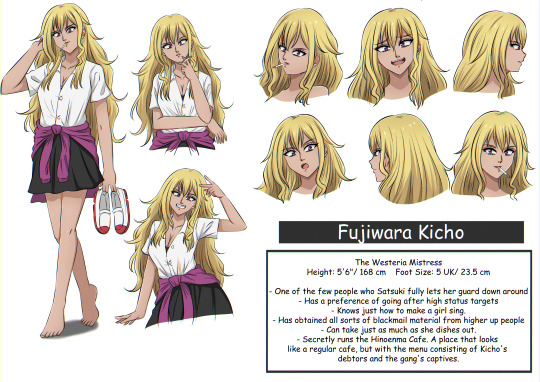
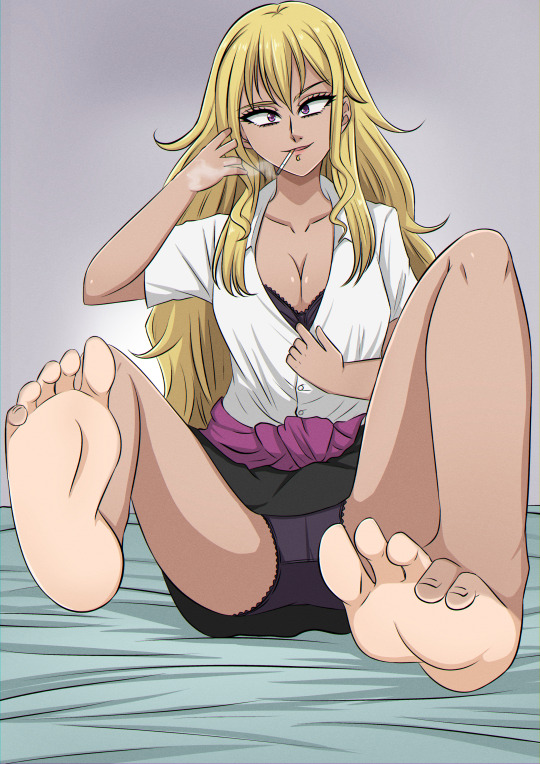
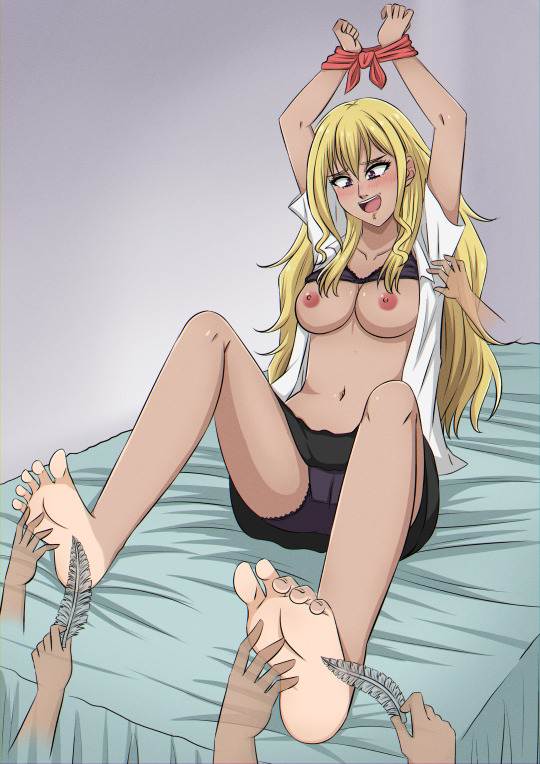
Fujiwara Kicho Bio by Nyankun21
Second in command of the Nakatagai Gang. Kicho Kicho may look like just an average girl who loves shoping, paries and taning, but is not to be underestimated.
12 notes
·
View notes
Text
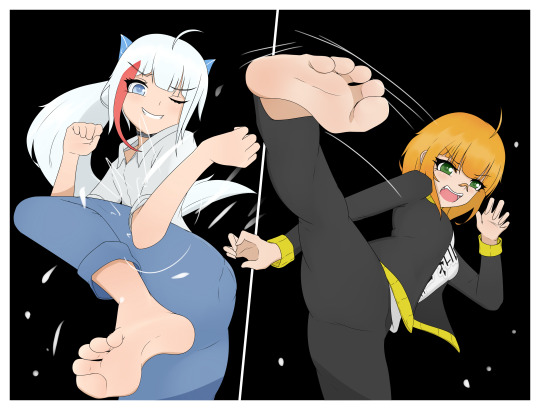
One of them is a women
9 notes
·
View notes
Text
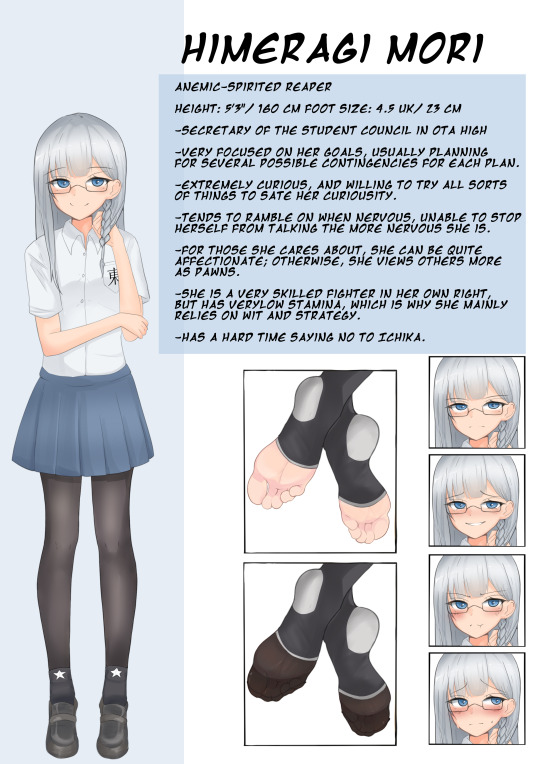
Himeragi Mori Reference Sheet
Like Lucy, wanted to upgrade Mori to a full on Refrence sheet.
Reference sheet was done by Deppy. Seriouosly, Thank you
8 notes
·
View notes
Text
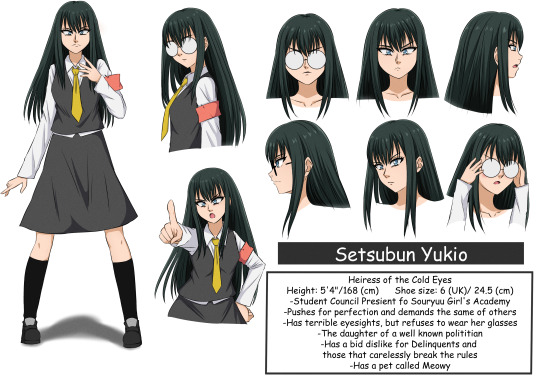
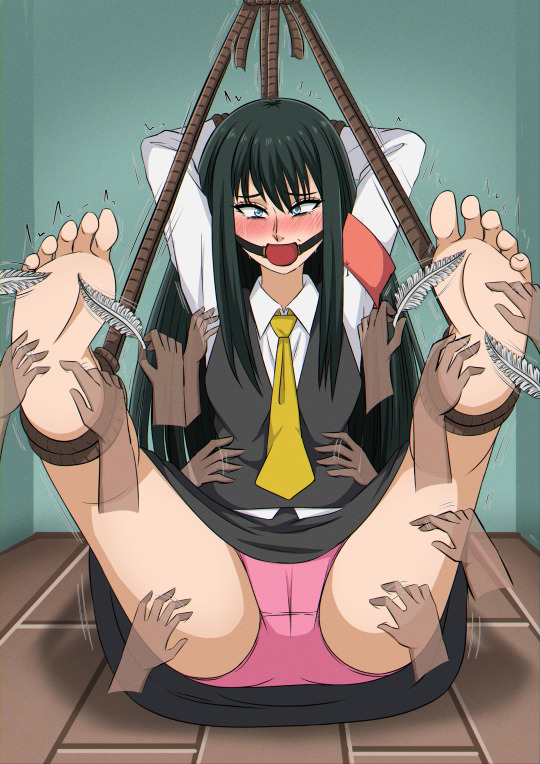
Setsubun Yukio by Nyankun21
This was a commisiosn piece done by Nyankun21, to help showcase a bit of the characters. Three a few others that can be already found in https://www.deviantart.com/grm013
11 notes
·
View notes
Text
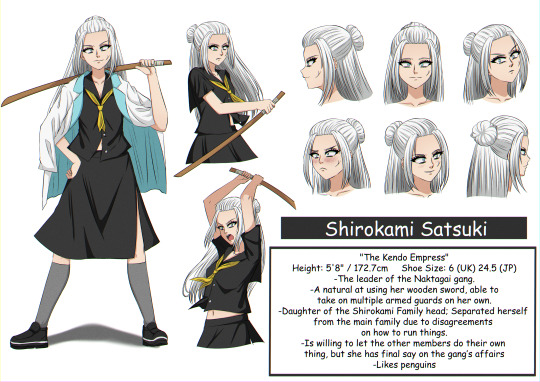
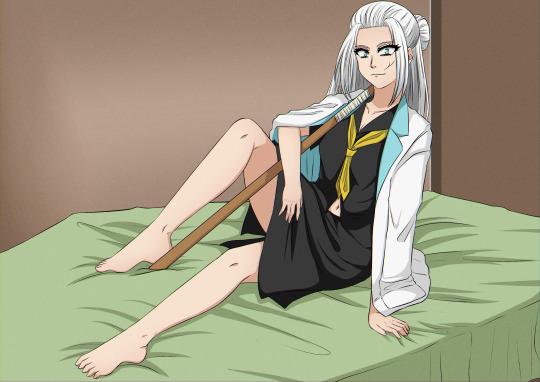
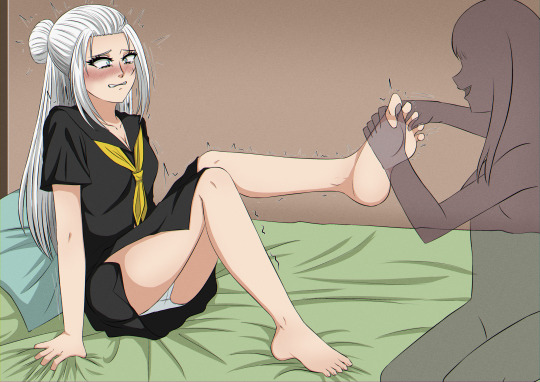
Shirokami Satsuki by Nyankun21
This was a commisiosn piece done by Nyankun21, to help showcase a bit of the characters. Three a few others that can be already found in https://www.deviantart.com/grm013
More will be updated here later.
9 notes
·
View notes
Text
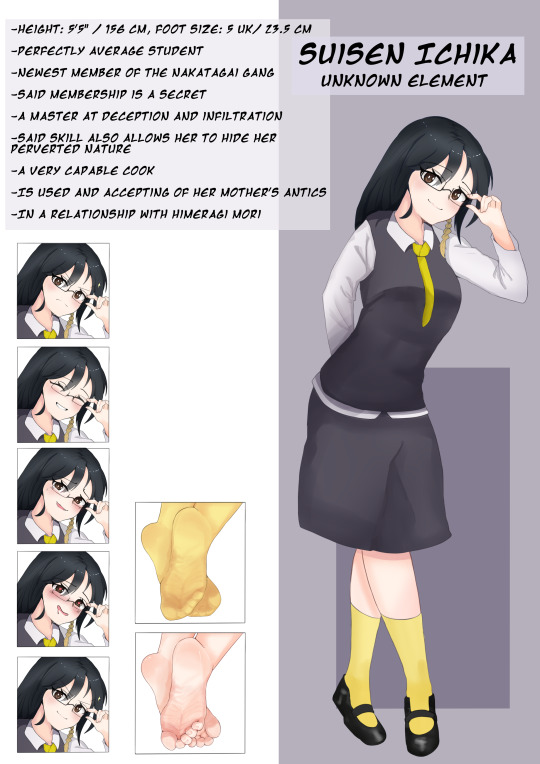
Suisen Ichika Character Sheet By Deppy
The newest memeber of the Nakatagai gang.
Art by Deppy
5 notes
·
View notes
Text
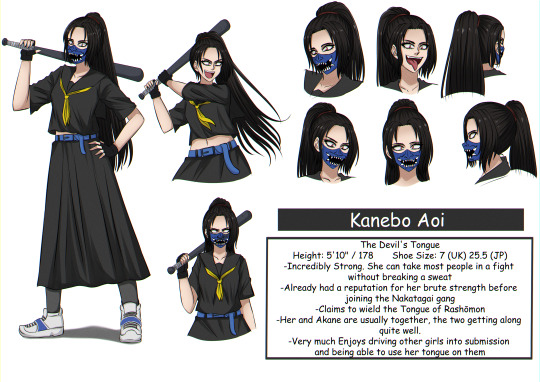
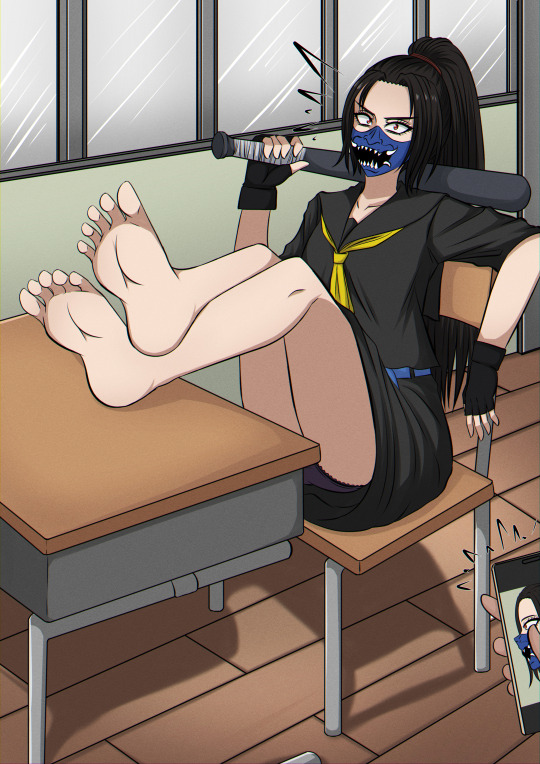
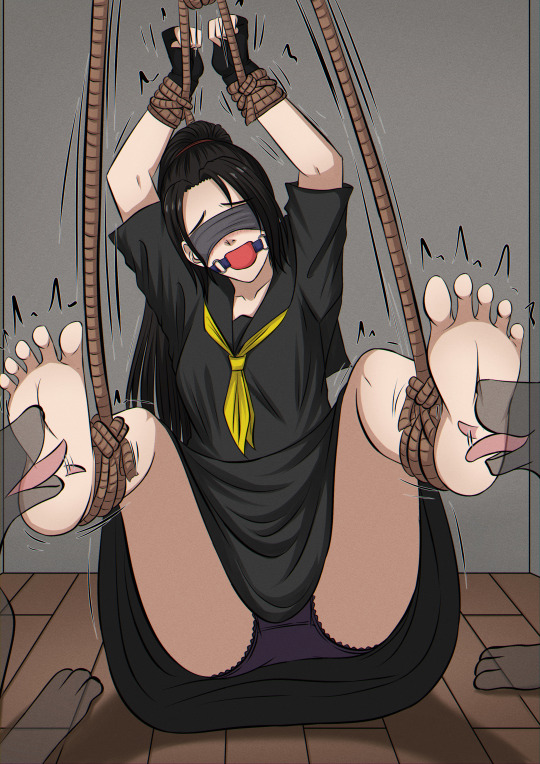
The power house of the Nakatagai gang Kanebo Aoi
art done by Nyankun21
3 notes
·
View notes
Text
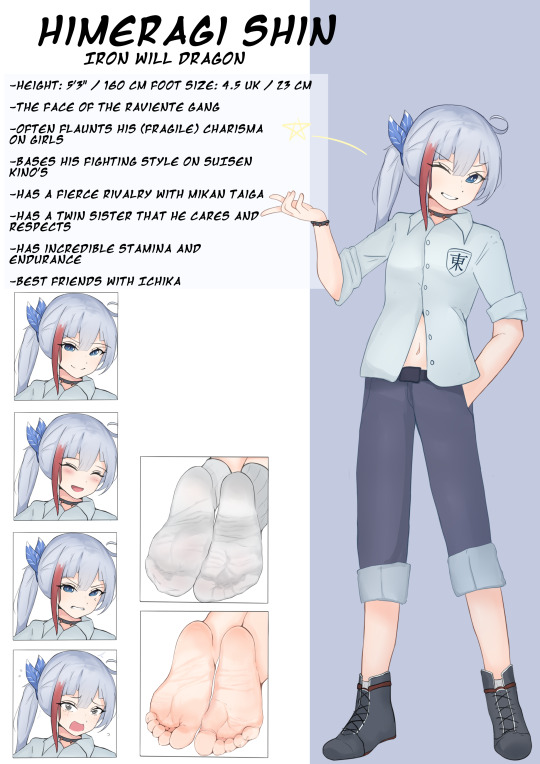
Nakatagai isn't the only delinquent gang at Ginmaru, Raviente being one of the bigger faction. Shin is usually seen leading the rest and isn't afraid to join in on the fights.
Art done by Deppy
4 notes
·
View notes
Text
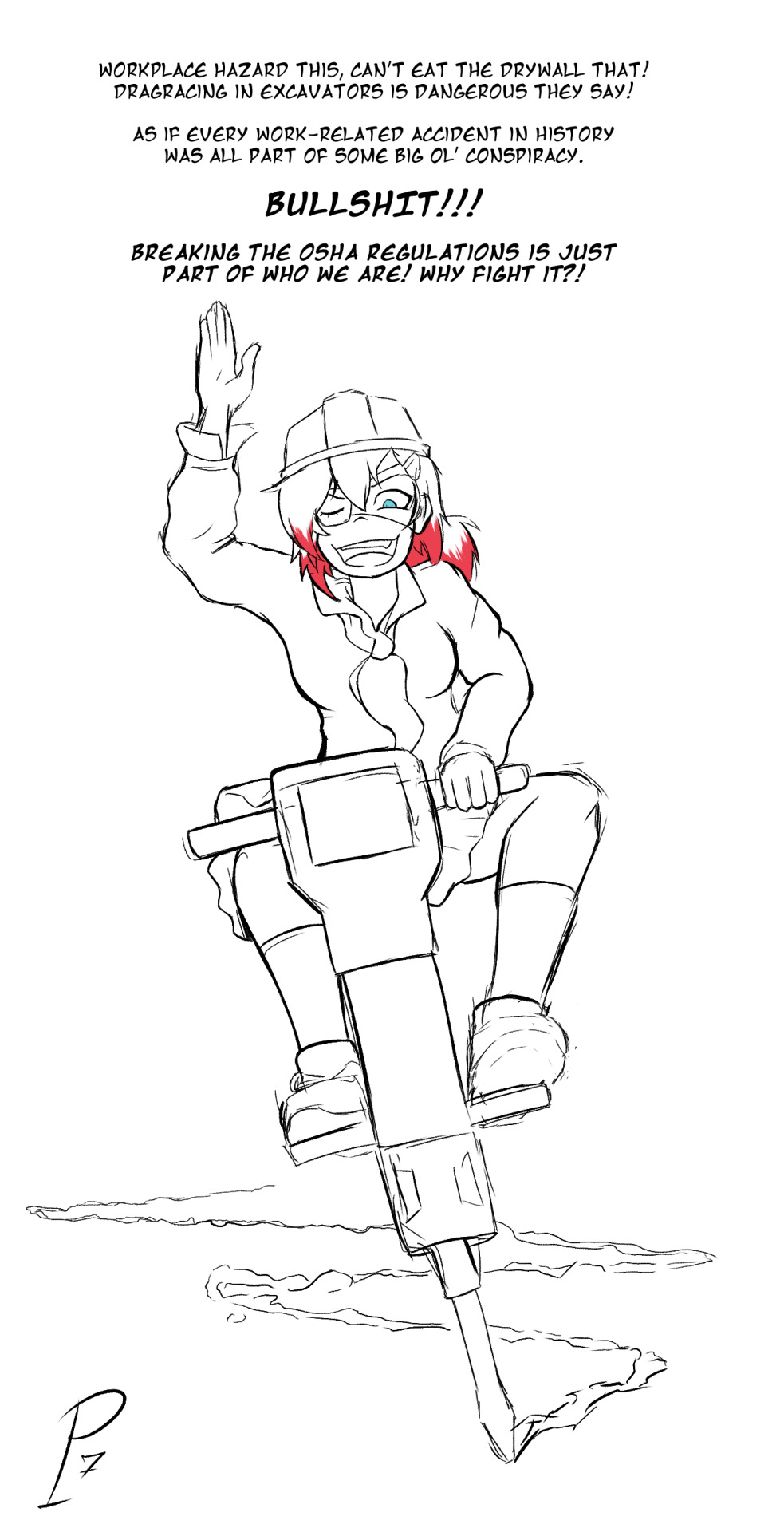
Akane Construction LLC By PraetorZ
Akane enjoys a little bit of trolling. The views are her own, and are not shared by us
Except PraetorZ
3 notes
·
View notes
Text
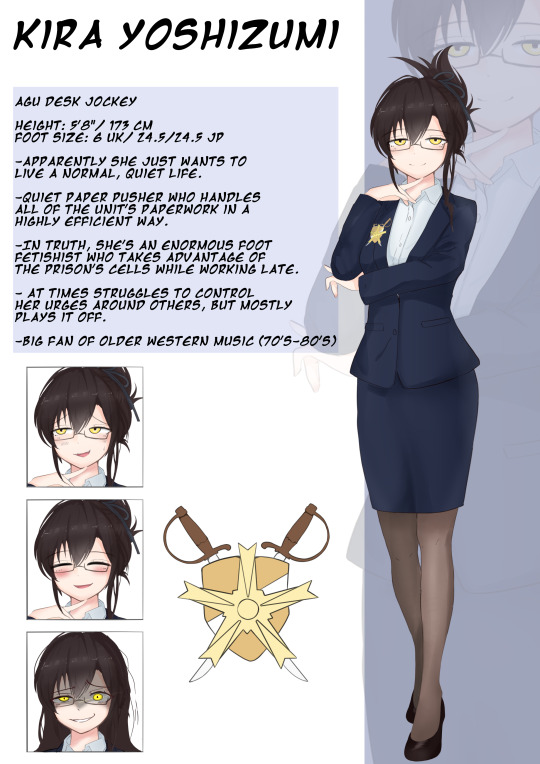
Kira Yoshizumi (OC)
"My name is Yoshizumi Kira. I'm 33 years old. My house is in the northeast section of Ginmaru, where all the villas are, and I am not married. I work as an officer for the Police Department’s Anti-Gang Unit, and I get home every day by 8 PM at the latest. I don't smoke, but I occasionally drink. I'm in bed by 11 PM, and make sure I get eight hours of sleep, no matter what. After having a glass of warm soy-milk and doing about twenty minutes of stretches before going to bed, I usually have no problems sleeping until morning. Just like a baby, I wake up without any fatigue or stress in the morning. I was told there were no issues at my last check-up. I'm trying to explain that I'm a person who wishes to live a very quiet life. I take care not to trouble myself with any enemies, that would cause me to lose sleep at night. That is how I deal with society, and I know that is what brings me happiness. Oh speaking of happiness, I’m utterly addicted to worshipping the feet of bound and gagged girls."
3 notes
·
View notes
Text
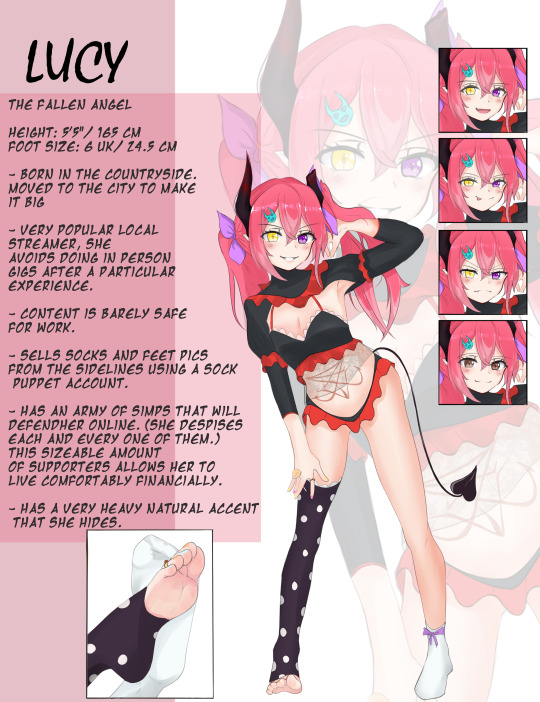
Lucy
The Fallen Angel
Remove the prevous Lucy piece since I felt she needed a better Bio to show off more of her.
The Reference sheet was done by Deppy which I'm always grateful for all they do.
3 notes
·
View notes
Text
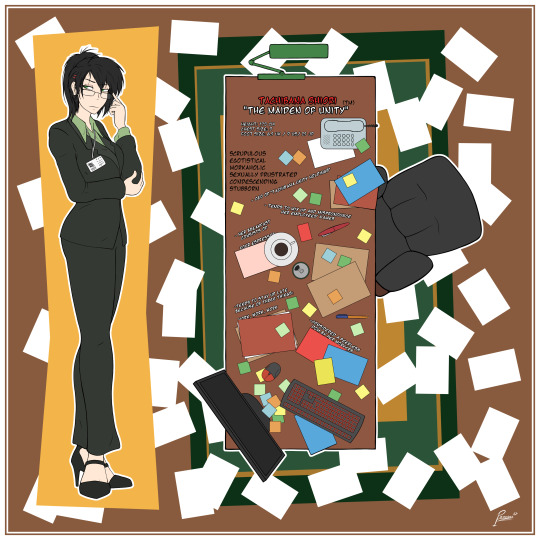
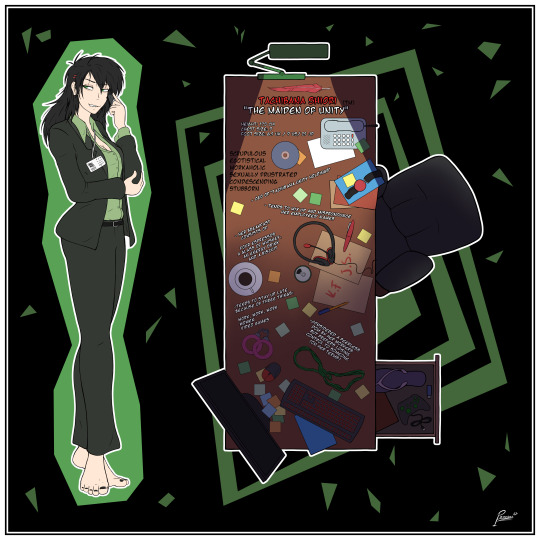
"I Chose More… I Chose The Impossible… I Chose Unity… N-No, it's not a reference to anything- shut up and get back to work!"
-Shiori
Art by PraetorZ
5 notes
·
View notes
Text

The line-up of the known/suspected members of Nakatagai, one of the most infamous street gangs in the districts of Ginmaru. Known for causing all sorts of trouble including shakedowns and abductions.
(Note: Unsure about the glasses girl, she was brought in during the raid already bound and gagged. Better safe than sorry.)
-Iba Hitomi, Chief Inspector of Ginmaru City Police Department - Anti-Gang Unit (AGU)
17 notes
·
View notes
Text
About Sukeban no Egao
!NSFW!
We're making RPG Maker games, heavily inspired by elements from Yakuza 0... with a few delinquent girls getting their smiles on. As development continues, we'll be adding more content as well as playable mini-games that will ultimately be a stepping stone for the project.
Please look forward to releases in this page:
https://roomukurei.itch.io/skbne
---
Concept basis:
https://www.deviantart.com/grm013/art/Nakatagai-Gang-Aoi-and-Akane-932625572
https://www.deviantart.com/grm013/art/Nakatagai-Gang-Kicho-and-Taiga-932628069
https://www.deviantart.com/grm013/art/Nakatagai-Gang-Ichika-and-Satsuki-932628281
Creators:
https://www.deviantart.com/grm013
https://www.deviantart.com/animesage8
https://twitter.com/praetorxz
https://twitter.com/roomukurei
9 notes
·
View notes